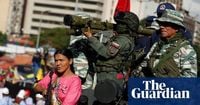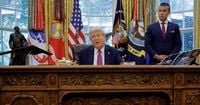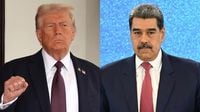The escalating standoff between the United States and Venezuela has taken a dramatic turn, as President Donald Trump’s administration moves from diplomacy to military action in its campaign against drug cartels allegedly operating under the protection of Venezuelan President Nicolás Maduro. This shift, reported by multiple major outlets including CNN, The New York Times, and Bloomberg, signals a potentially unprecedented expansion of U.S. counter-narcotics efforts—one that could reverberate throughout the region and beyond.
On October 7, 2025, CNN revealed the existence of a classified Justice Department memo, which, according to people familiar with the matter, asserts that President Trump possesses legal authority to order deadly force against drug cartels posing imminent threats to Americans. The memo, reportedly crafted by the Office of Legal Counsel (OLC), frames cartels as such severe dangers that they can be targeted with lethal strikes, even if they are not officially designated as terrorist organizations. The U.S. government has specifically accused Maduro of leading a cartel, raising the stakes of any military engagement.
Attorney General Pam Bondi, testifying before Congress on October 7, 2025, stopped short of confirming the memo’s existence but did not mince words about Maduro. “What I can tell you is Maduro is a narco-terrorist,” Bondi declared, highlighting her department’s $50 million bounty for Maduro’s capture to face U.S. charges. Her testimony comes as pressure mounts on the administration to clarify its legal rationale for recent military actions and as lawmakers grow increasingly uneasy about the prospect of further escalation.
According to The New York Times, President Trump has halted all diplomatic outreach to Venezuela, including talks led by envoy Richard Grenell. This move, which aligns with the more hardline approach championed by Secretary of State Marco Rubio, effectively ends any hope for a negotiated solution in the near term. “I believe in diplomacy,” Grenell remarked at a Conservative Political Action Committee event in September. “I believe in avoiding war.” Yet, Trump reportedly called Grenell during a meeting and instructed him to stop all diplomatic engagement, including with Maduro himself.
The breakdown in diplomacy comes amid a series of U.S. military strikes on vessels in the Caribbean. Since the start of September, the U.S. military has targeted at least four boats originating from Venezuela, killing more than twenty people. The Trump administration alleges these boats were operated by Venezuelan cartels such as Tren de Aragua, which was designated a foreign terrorist organization earlier in 2025. The White House has framed these operations as acts of national self-defense against “narco-terrorism” in the Caribbean Sea.
Defense Secretary Pete Hegseth, speaking on October 3, 2025, described a recent strike in international waters near Venezuela that killed four men on a boat. He called the men “narco-terrorists” and delivered a pointed message: “These strikes will continue until the attacks on the American people are over!!!!” That operation marked at least the fourth such strike in recent weeks, underscoring the administration’s willingness to use military force in the region.
The Caracas government has responded by placing its military on alert and mobilizing citizen militias, especially after U.S. planes reportedly flew near Venezuela’s coast in the week leading up to October 8. The presence of U.S. naval ships, some carrying Marines, off Venezuela’s coast has further heightened tensions. According to Evan Ellis, a Latin America researcher at the U.S. War College who served under Trump during his first term, the deployment of military assets suggests the U.S. may be preparing for escalation. “President Trump, my general sense is—his patience has run out,” Ellis commented.
Trump himself hinted at an expansion of the campaign against drug traffickers during a U.S. naval event on October 5, 2025. “They're not coming in by sea anymore, so now we'll have to start looking about the land—because they'll be forced to go by land,” he said, adding, “And let me tell you right now, that's not going to work out well for them either.” These remarks suggest that the administration is considering targeting drug traffickers who attempt to cross into neighboring countries by land, a move that could further destabilize the region.
Maduro, for his part, has attempted to deescalate by sending a letter to Trump seeking dialogue. The White House, however, flatly rejected the overture. U.S. military experts, such as Frank Mora, a former deputy assistant secretary of Defense for the Western Hemisphere during President Obama’s first term, believe that an attack on drug trafficking targets within Venezuela is a real possibility. “Deploying a naval flotilla to then not do anything, or simply take out some speed boats—I do not think that is what they had in mind,” Mora told AFP. He added that the Trump administration’s goals remain ambiguous: “On one hand the president says he wants to dismantle the drug traffic. But at the same time, the hope is that this leads to the collapse of the regime.”
As the U.S. shifts its posture from law enforcement to what the White House now calls an “armed conflict” with drug cartels, legal and diplomatic questions have come to the fore. A White House notice sent to Congress in early October referred to suspected drug smugglers as “unlawful combatants,” a term that unlocks the most extreme legal powers a state can wield. The administration’s declaration of an “armed conflict”—essentially a legal state of war—against cartels marks a major shift in U.S. counternarcotics policy. It echoes the legal framework used in the fight against al-Qaeda, but many legal experts argue that the analogy is a stretch. As Matthew C. Waxman, an adjunct senior fellow at the Council on Foreign Relations, points out, “The administration hasn’t persuasively made the legal case that drug cartels are waging war against us like al-Qaeda was, nor is it clear whether the White House acknowledges any limits to its theory.”
Congress’s role in authorizing military force is another flashpoint. While the war against al-Qaeda and its affiliates was authorized by Congress in 2001, no such authorization exists for the current campaign against drug cartels. Lawmakers have begun to push back, questioning the administration’s authority to use lethal force without their approval and raising concerns about violations of international law, especially if strikes occur within Venezuelan territory. The United Nations Charter prohibits the use of force against the territorial integrity of member states without consent, a principle the administration may seek to challenge by arguing that Venezuela is “unwilling or unable” to neutralize the threat.
Despite the mounting risks, the Trump administration’s legal justifications remain largely opaque, fueling further uncertainty at home and abroad. As Attorney General Bondi prepares for more questioning on Capitol Hill regarding the OLC memo and the legal basis for recent strikes, the world watches to see whether President Trump will authorize even more aggressive action—or, as some experts speculate, pivot toward a deal if one emerges that satisfies his objectives.
With diplomatic channels closed, military assets on alert, and legal questions swirling, the U.S.-Venezuela standoff has entered a dangerous new phase. What happens next could reshape not only the future of both nations, but the broader rules of international engagement in the fight against transnational crime.



